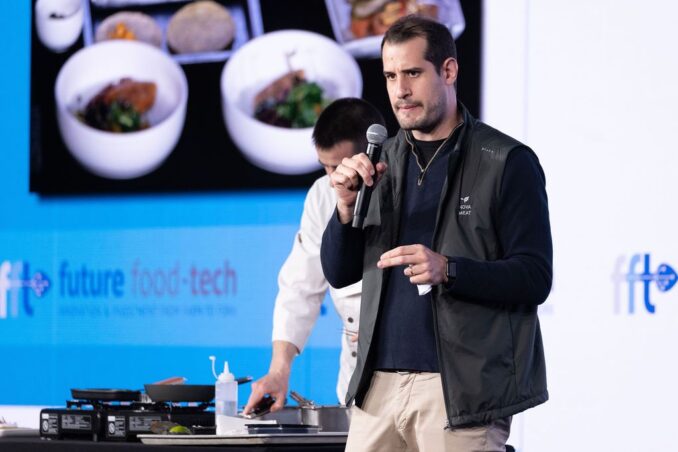While investor sentiment may have soured on alternative proteins, the recent Future Food-Tech summit in San Francisco attracted a record number of foodtech startups showcasing everything from a chatbot steeped in the latest food trends to lactoferrin from precision fermentation.
AFN caught up with a selection of exhibitors at the event, which brought together 1,700 entrepreneurs, investors, and food industry professionals from 52 countries.
TasteGPT… ‘like having a personalized, concierge market research assistant that’s always available’

Tastewise is an Israeli AI-powered startup with an online platform helping food & beverage companies from PepsiCo to Nestlé scour data from restaurant and delivery menus, online recipes, and social media posts to develop actionable insights on emerging trends.
Its new tool, TasteGPT, a conversational chatbot using generative AI, delivers insights from the same data set in seconds, “like having a personalized, concierge market research assistant that’s always available,” says the company, which raised $17m in a series A round last year led by Disruptive AI.
TurtleTree debuts lactoferrin via fermentation: ‘A clear path to profitability on a per unit basis in 6-12 months’

While the unit economics of manufacturing commodity dairy ingredients such as whey protein via precision fermentation can be challenging, bovine lactoferrin currently sells for $700-1,500/kilo, making the economics of producing it with microbes much more appealing, says biotech startup TurtleTree. “Straight out of the gate, we will be able to sell at a positive gross margin.”
LF+, slated to hit the market later this year, is the world’s first lactoferrin produced at an industrial scale via microbial fermentation, claims TurtleTree, which has offices in Singapore and San Francisco.
It will initially be targeted at adult nutrition markets such as sports nutrition before TurtleTree can secure approvals to access the infant formula market with the bioactive milk protein, which has benefits around immunity, iron regulation, digestive health, endurance, and muscle strength.
Novameat: ‘We believe this is the next generation technology for plant-based meats’
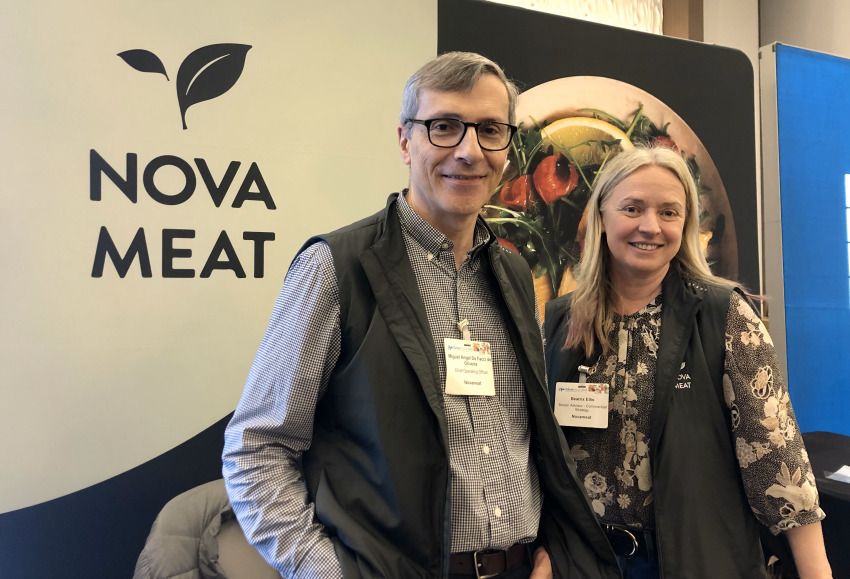
Barcelona-based plant-based meat startup Novameat has “migrated from 3D printer technology to create [meat-like] fibers [from plant proteins] into using commercial-scale machinery that can run at 500 kilos an hour,” COO Miguel Angelo De Facci de Oliveira told AFN.
The “low temperature, low pressure” texturizing technology, which Novameat describes as “microforce technology,” is cheaper and faster than high moisture extrusion, and enables the production of strips, steaks, chunks and pulled meats without the use of ingredients such as methylcellulose, he claimed.
He added: “We have decided to be a b2b company, we’re not creating brands. We are focusing on the B2B foodservice market to provide meat that companies can use in their own recipes, and we can do [plant-based] pork, chicken and beef. We believe this is the next-generation technology for plant-based meats.”
Helaina: Immune-supporting glycoproteins found in breastmilk… made via fermentation

New York-based startup Helaina is using microbial fermentation to produce immune-supporting glycoproteins found in breastmilk for the adult and infant nutrition markets.
While several companies are supplementing infant formula with human milk oligosaccharides (HMOs), health-promoting carbohydrates found in breastmilk that are consumed by bacteria in the infant gut, Helaina is focusing on immune-supporting glycoproteins, CTO Dr. Anthony Clark told AFN.
“We’re scaling the fermentation via contract manufacturers,” added Clark, who said Helaina is going through the GRAS (Generally Recognized as Safe) process in the US to affirm the safety of the ingredients and plans to go through the Novel Food Regulation in the EU. To access the US infant formula market, however, it will need to submit clinical trial data to the FDA in a separate process.
“There is evidence in the literature to show that these immunoproteins can help the microbiome in the elderly, as well as in infants, and we’ve had a lot of inbound interest from ingredient providers and packaged food companies.”
Bovine colostrum, which cows produce just after giving birth, is packed with immunoglobulins and other nutrients that have already attracted interest in the human nutrition market in supplements and foods, noted Clark, “And the [human] form [of the immunoglobulins] we’re making is much more functional in humans than the bovine version.”
Kynda Biotech: Plug-and-play bioreactors for mycelium biomass fermentation
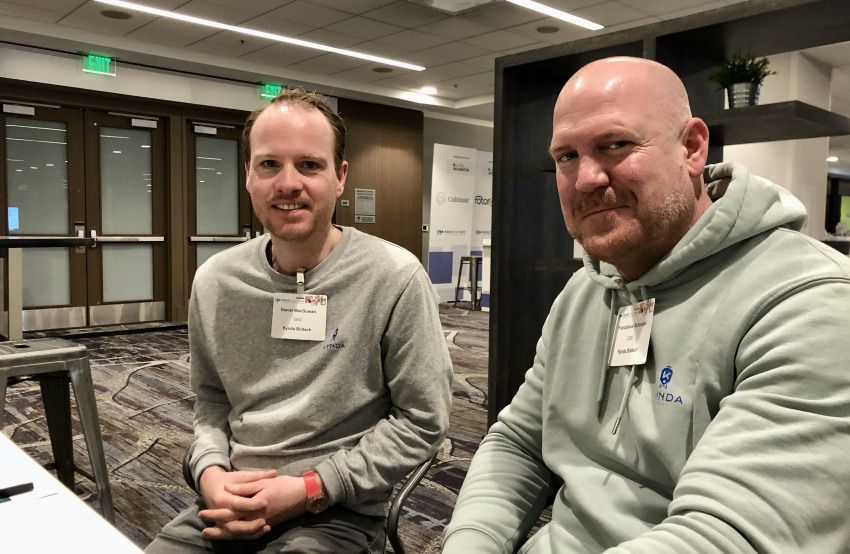
German startup Kynda Biotech aims to supply ‘plug & play’ 1,000-10,000-liter bioreactors for fungal biomass fermentation, enabling, for example, food manufacturers with a sugar-rich waste stream to use it as feed for mycelium (fungi) that they could then sell to petfood or human food markets.
“It has to be system that can be operated by anybody,” CEO Daniel MacGowan-von Holstein told AFN. “We provide the starter cultures, the hardware, and ongoing support to maintain and run the bioreactors.”
To demonstrate the technology in action, Kynda has a showcase plant near Hamburg, he said. “We’ll have about 30,000 liters of production capacity by the end of the year.”
The Supplant Company utilizes ‘forgotten half of the harvest’ to make low glycemic sugars, flours
The Supplant Company showcased two products at the show: sugars from fiber: a low-glycemic blend of sugars extracted from upcycled feedstocks that performs like table sugar but is metabolized more like fiber; and grain and stalk flour, which incorporates fibers from wheat stalks as well as grains. [Disclosure: AgFunder, AFN’s parent company, is an investor in Supplant.]
Mewery: Cultivated pork… with algae?
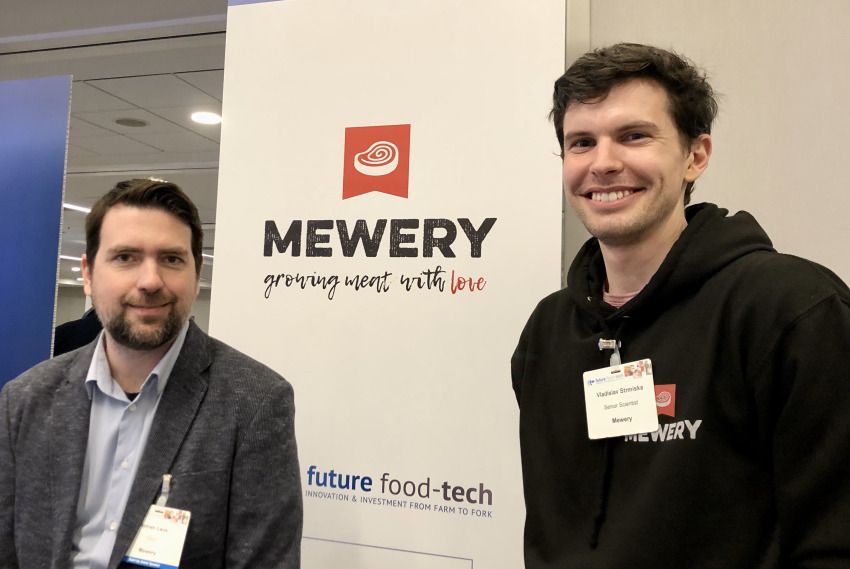
Czech-cultivated meat startup Mewery combines porcine cells and algae cells in its process, senior scientist Vladislav Strmiska told AFN.
“Using microalgae we can replace FBS (fetal bovine serum) in growth media, maintain 3D structures as a scaffold, and increase the nutritional value of the final product.
“We’ve experimented with minced products that are 75% pork cells and 25% algae, but the ratios are customizable. We plan to start in Singapore and Asia and then go to the US.”
Foodberry creates novel snacking experiences

Materials tech startup Foodberry has a series of patents covering technology to create novel hand-held snacks with edible coatings, from hummus bites with a red pepper skin to ‘yogurt berries’ with yogurt on the inside and fruit on the outside, CEO Marty Kolewe told AFN.
“We’re also able to coat cut fruits so we can have mango with a blueberry skin to make it last a bit longer. For the coatings we can use alginates, citrus fibers, or mushroom fibers. Our IP is around how we layer these together.”
Perfect Day: Beta lactoglobulin from fermentation… a new tool in the egg replacement toolbox?
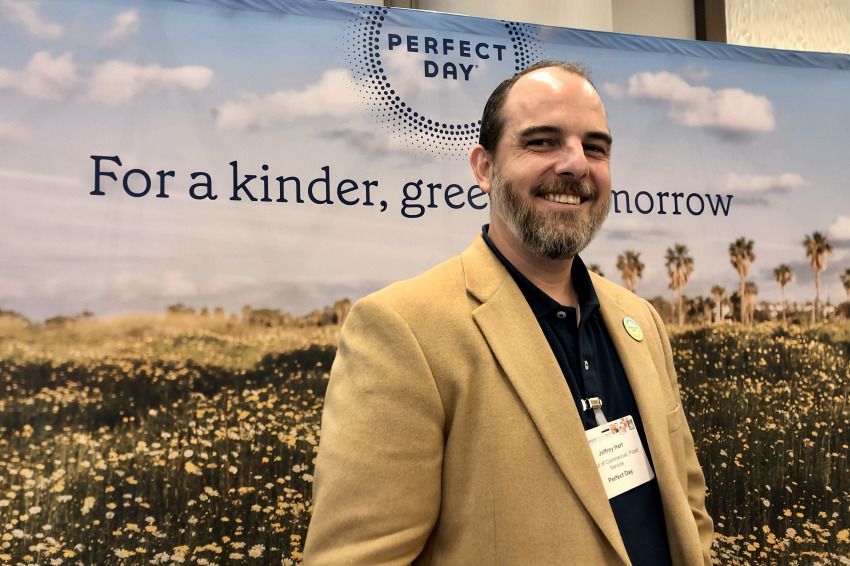
Beta lactoglobulin—the whey protein Perfect Day is producing from a genetically engineered strain of fungi—is now used in a variety of dairy products from ice cream to milk chocolate.
But it can also be used in combination with potato starch, xanthan gum and tapioca as an effective egg replacement in multiple food applications, Jeffrey Hart, head of commercial, foodservice, told AFN.
“The beta lactoglobulin protein functions differently than straight bovine whey [which also contains other proteins].”
He would not say what ingredients Perfect Day plans to commercialize next, but added: “We know there’s demand for caseins, alpha lactalbumin… and lactoferrin, we think that’s going to be a really big market.”
While most of the companies currently utilizing Perfect Day’s whey protein from fermentation are startups, he said, “We are having different kinds of conversation now with established traditional brands either talking about starting a new product line or including our ingredients into their existing products.”
Myodenovo emerges from stealth, focuses on whole cuts of cultivated meat to reach ‘diehard meat lovers’
Raleigh-based cultivated meat startup Myodenovo is emerging from stealth with a mission to create thick, whole cuts, starting with a filet mignon steak.
Premas Biotech talks precision fermentation: ‘We work with companies from the very early stages’
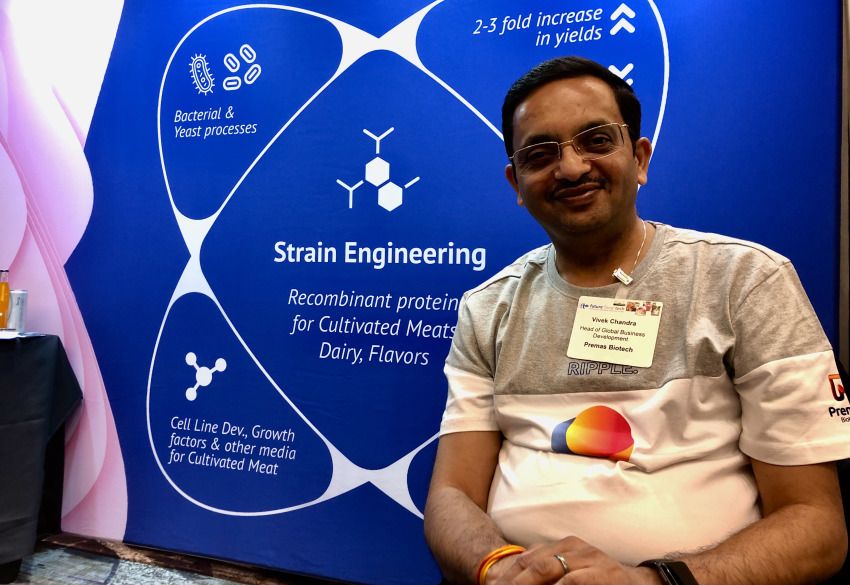
New Delhi-based recombinant protein production specialist Premas Biotech is working with Perfect Day on “a number of products” including casein proteins made via yeast, other dairy proteins, and sweeteners, head global business development Vivek Chandra told AFN.
“We’re also working with companies that are focused on flavors, texturizing ingredients and other things for cultivated meat including growth factors [for cell culture media].”
He added: “Customers might give us a [DNA] sequence or we can do it on our own. From there, we test different expression systems [to find the best microbial host to express the target protein], and then we have fermentation tanks ranging from 5-liters to 500-liters where we can test production and downstream processing. After this, companies can either develop their own facilities or work with a contract manufacturer to scale up.”

